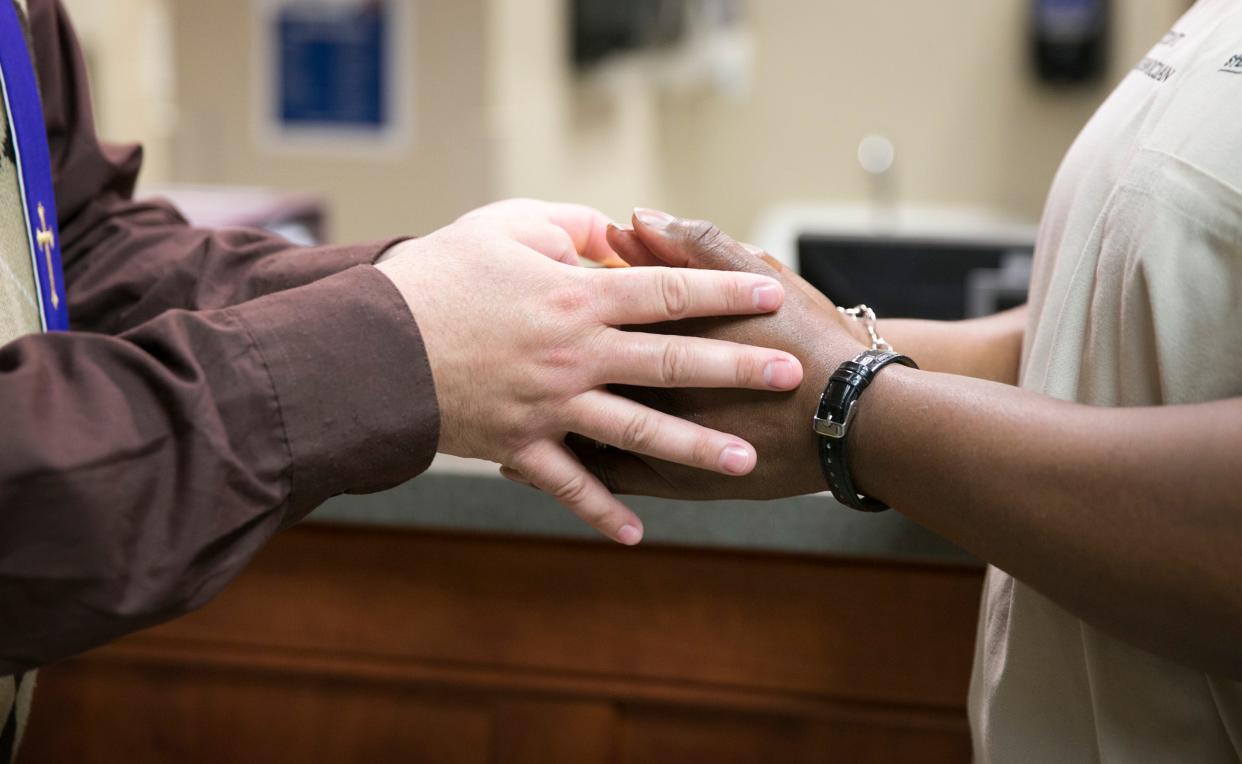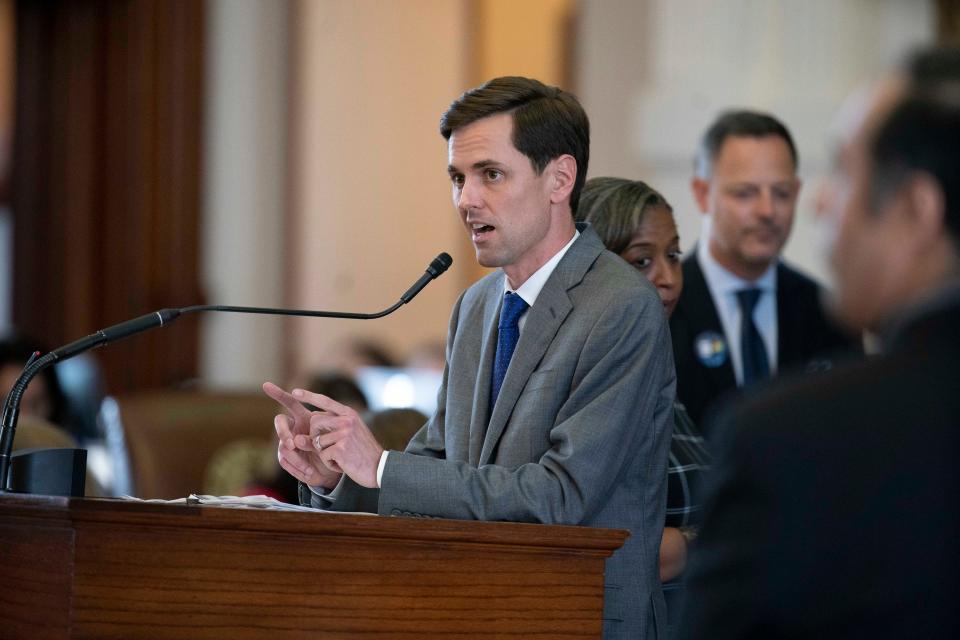Grumet: Texas public schools need more counselors — not religious chaplains

I kept hearing words like “surprised” and “stunned.”
Few observers expected the Texas Legislature to pass a law this session allowing public school districts to bring in religious chaplains to provide counseling to students.
But here we are.
Senate Bill 763, which is headed to the governor’s desk after passing both chambers on party-line votes, says public schools may choose to hire chaplains or accept faith leaders as volunteers to provide “support, services and programs for students.” Such clergy members would be a regular presence on campuses that want them.
Supporters say their goal is to address mental health needs and a shortage of school counselors. But the bill provides no certification requirements to ensure chaplains have relevant training to counsel youths; no standards for accommodating students from a range of faith traditions; and no prohibition on proselytizing.
And despite the mantra of parents’ rights echoing through the Capitol on other education issues this session — from vouchers to school library books — no parental consent would be required for a chaplain to speak with a kid about deeply personal matters.
On a certain level, SB 763 would provide support to some students who want a chaplain’s guidance. But the measure is also designed to pour gasoline on fiery school board politics: School boards will be required to take a public vote next school year on whether they’ll bring in chaplains, setting the stage for more ideological showdowns with activists wanting to remake public education.
And the measure practically dares critics to file the kind of legal challenge that could catapult this hot-button issue to the U.S. Supreme Court, where a new conservative majority has upheld other forms of religious expression in public institutions.
SB 763 is a counseling gesture doubling as a crusade.
I recognize that faith leaders have long played an essential role in strengthening communities and comforting those who are hurting. But that work has historically stood apart from government agencies — for good reason.
“Generally, when government gets involved with religion, it cheapens both,” said Joshua Houston, the advocacy director at Texas Impact, an interfaith advocacy group representing some of the largest congregations in Texas.
In the case of SB 763, the selection of chaplains from a particular faith could “start to look like we’re establishing a state religion,” said Texas Impact Executive Director Bee Moorhead.
Big differences between counselors and chaplains
Sen. Mayes Middleton did not respond to my questions about his bill, but the Galveston Republican emphasized in a committee hearing last month that chaplains provide “nonreligious spiritual care.”
Several chaplains echoed that idea, saying their job is to provide comfort and encouragement, not push their own religious views. Middleton argued schools could use their help.
“Over the last few years, we have seen an increase in mental health issues among our students,” Middleton told the Senate Education Committee on April 5. He added that chaplains could "handle trauma care for our students, confidential counseling and other mental health (support).”

Middleton and other supporters rightly note the shortage of school counselors and the clear need for greater mental health care. Texas rates among the worst states in access to mental health care, and overall, our schools have about half as many school counselors as they need.
Experts recommend one school counselor per 250 students; Texas averages one per 423.
Lawmakers could have tackled that problem head-on by providing more funding for school districts to hire additional counselors. Or they could have created incentives and training support for more people to become school counselors, a role that requires a master’s degree plus two years of classroom teaching experience.
Instead, with SB 763, school districts can bring in a chaplain who may have little to no training. An ordained minister may be someone who went through a rigorous seminary program — or it could be someone who completed a one-day online certification in order to officiate a friend’s wedding.
It would be up to school districts to vet potential chaplains.
“When the bill was initially introduced, the school counseling community, (and) truthfully the public ed community at large, was speechless,” Jill Adams, president-elect of the Texas School Counselors Association, told me.
Adams noted the roles of chaplain and school counselor aren’t even comparable. Beyond providing emotional support to individual students, counselors help teachers address behavioral issues; assist students with academic goals and career planning; contribute to special education plans; evaluate performance on standardized tests; and lead efforts to help students develop healthy coping and communication skills.
Adams said schools need more of the trained professionals who can do all of that work.
“Students are not as equipped to manage their emotions in order to be able to learn and to function, and that is the crisis,” she told me. “We’re rolling downhill with a boulder, and we need to put some things in place so that it doesn’t roll over all of us.”
Reintroducing religion
But there’s a different force gaining steam: the push to assert religious values in secular spaces.
Beyond the school chaplains measure, the Texas Senate has passed bills this session to require every public school classroom to display a copy of the 10 Commandments (SB 1515) and to allow public schools to establish times for voluntary Bible study or prayer (SB 1396). Both measures are pending in the House.
Experts cite several factors behind this push. Recent Supreme Court rulings, including last year’s 6-3 decision protecting a football coach’s right to hold public prayers after high school football games, show a court willing to chip away at the long-honored separation between church and state.
Melissa Deckman, CEO of the Public Religion Research Institute, a nonprofit that studies the intersection of religion and politics, also pointed to the politicization of school boards as communities wrestle over classroom discussions about race and LGBTQ+ issues, prompting conservatives to assert their faith-based values.
And plainly there is an effort to rebuild the influence of religion at a time when it is waning. According to new research from PRRI, nearly 6 in 10 Americans say they seldom or never attend religious services — up from 4 in 10 Americans a decade ago.
“The desire for some conservative Christians to promote these bills is a reflection of those trends,” Deckman said. “I think there’s a sense that if we can bring a chaplain to school, to bring God’s word to those students, that is a way to reintroduce religion to some students.”
Again, the proponents of SB 763 say chaplains would merely provide general spiritual support, not religious instruction — and only to those students who want to talk. But if the goal is to meet students’ mental health needs, why not focus on hiring more school counselors who are trained to serve everyone?
For months now, Gov. Greg Abbott has argued that schools should not be places of indoctrination. We’ll see whether he still believes that once SB 763 arrives at his desk.
Grumet is the Statesman’s Metro columnist. Her column, ATX in Context, contains her opinions. Share yours via email at bgrumet@statesman.com or via Twitter at @bgrumet. Find her previous work at statesman.com/news/columns.
This article originally appeared on Austin American-Statesman: Grumet: Texas public schools need more counselors — not chaplains

